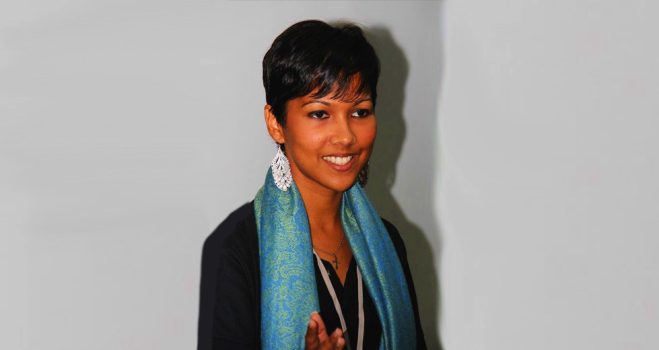“The certifications out of the courses enabled me to become a stronger advocate in issues of justice,” Rev. Sanya Beharry reflected as she spoke about the transformative impact of the Global Institute of Theology (GIT) program offered by the World Communion of Reformed Churches (WCRC).
As an ordained minister of the Presbyterian Church of Trinidad and Tobago (PCTT), Beharry has emerged as a prominent figure within her faith community, with her journey through the GIT program playing a key role in shaping her leadership and theological outlook.
Beharry graduated from St. Andrew’s Theological College (SATC) in 2019, and today holds several leadership positions within the church. She serves as Chair of the Northern Presbytery, Chair of the Board of Theological Education, Vice-Chair of the Christian Council of Trinidad and Tobago, and lectures occasionally at SATC. However, it was her participation in the GIT program in 2017 that provided her with the intellectual tools and practical insight needed to address the complex challenges facing the church and broader society.
Reflecting on her decision to join the GIT program, Beharry spoke about her passion for the global ecumenical movement. “At the time, I was the only student in training for ministry within the PCTT, and I’ve always had a special love for the global ecumenical family,” she shared. The opportunity to be part of an international gathering of theological students was especially meaningful to her, particularly in the context of the 500th Reformation anniversary celebrations in Germany. The GIT program allowed her to engage with a rich historical legacy while exploring new theological perspectives alongside peers from around the world.
The curriculum of the GIT program was diverse and comprehensive, with Beharry pointing to three particularly impactful areas: eco-theology, human sexuality, and the intersection of the Bible and Empire. These subjects, she noted, did more than broaden her theological understanding—they equipped her to become a more effective advocate for justice within her community. “The exposure to these topics strengthened my ability to engage with pressing social issues in a meaningful way,” she said, emphasizing how the program deepened her commitment to addressing the challenges of today’s world through a theological lens.
A key aspect of the GIT program that stood out for Beharry was the opportunity to connect with the historical roots of the Reformation. “Being able to physically visit Wittenberg and worship in the church where Martin Luther preached was profound,” she reflected. This direct engagement with the sites and stories of the Reformation helped solidify her understanding of Reformation theology, while the program’s lecturers provided a nurturing environment for deeper intellectual exploration. “The lecturers were approachable, kind, and brilliant,” she noted, praising both their formal teaching and their informal guidance during the program.
The GIT experience was particularly valuable to Beharry as it introduced her to what she describes as “newer” theologies. This exposure to evolving theological thinking inspired her to continue her academic journey, leading her to pursue an MTh in Theological Education in the Economy of Life (TEEL), which emphasizes the importance of context in theological education. “It was one of my earliest exposures to the fact that theological thinking is still alive and happening in today’s world,” she explained. This realization continues to influence her current studies and leadership approach.
For those considering the GIT program, Beharry offered words of encouragement: “Keep an open mind and have as many conversations as possible with lecturers and people from all around the world whose experiences are very different from yours. Be prepared to work hard and be challenged.” Her advice reflects the program’s commitment to fostering a diverse and inclusive learning environment, encouraging participants to engage fully with the complexities of modern theological discourse.
In addition to the academic rigor, the GIT program also emphasized the importance of self-care and community. Beharry credited program coordinator Dr. Aruna Gnanadason for creating a space where participants could bond through activities such as singing, dancing, and personal reflection, which helped to promote mental and emotional well-being during the intense academic program. “Dr. Gnanadason made sure we had personal time and opportunities to connect as a cohort, which contributed positively to our mental health,” she shared.
Beharry described the GIT program as “a unique experience in tertiary theological education that will provide a solid foundation for your future as a scholar, pastor, or ecumenist.” The program, she emphasized, is not just about academic achievement but about equipping leaders with the tools to make a meaningful difference in their communities.
The Global Institute of Theology equips leaders like Beharry with the faith, wisdom, and tools needed to address modern societal challenges, offering a unique opportunity for intellectual and spiritual growth in real-world theology.


